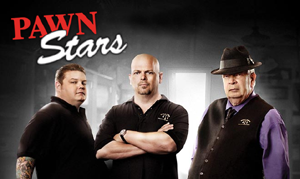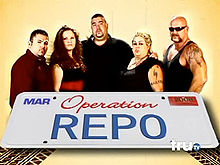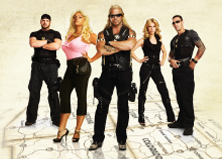Reality television shows
Reality television shows have been around for a few years. Usually (but not always) unscripted, they allow viewers to observe the lives of others as they go about their day to day routine. Some of them are completely artificial situations, such as Big Brother or Survivor, while others are based on a slightly more tangible version of reality, such as American Chopper. There are also some based on celebrity families (The Osbournes, Growing Up Gotti, Hogan Knows Best, Hammertime, and Gene Simmons’ Family Jewels) but in many cases these shows tend to show just how incredibly disfunctional these families are and consequently most are short-lived. (Gene Simmons’ Family Jewels is one of the rare exceptions to this rule.)
The latest batch of reality shows includes a number that are based on businesses, which I tend to find more interesting than the look-how-amazing-I-am-and-you’re-not reality shows that are out there.
Here’s my take on some of the reality shows that are on the air right now.
 Pawn Stars (History TV)
Pawn Stars (History TV)
Pawn shops have been around for thousands of years. Basically, if you need some cash, you can take something you own to a pawnbroker, say a watch, and borrow against its value. The loans have short terms and if you don’t pay it off when they’re due the pawnbroker will sell whatever you brought in. During the 1950s, pawning was the leading form of consumer credit in the US. Even today, it remains one way for people to obtain cash by borrowing against something they own. Many pawn shops will also outright buy items. If you sell something to a pawnbroker, you shouldn’t expect to receive what you’d have to pay for it. Pawnbrokers make their money by buying low and selling high.
History TV’s Pawn Stars follows the people in the Gold & Silver Pawn Shop in Las Vegas, Nevada. Owned by the Harrison family, it’s a family-run business with three generations in the shop: Richard (grandfather), Rich (father) and Corey (son). The show follows a number of transactions every episode from when the seller walks in with the item to when the deal is made (or not). Along the way we learn a bit about the items being sold and the negotiations that ensue. Of course, we also see the back and forth that goes on between the Harrisons and the other people that work in the store.
I like this show. It’s well-produced, has more to it than just "hey, I want to sell this ring" and it doesn’t make you want to scream at your television (unlike other shows in this list).
 Ice Pilots NWT (History TV)
Ice Pilots NWT (History TV)
Canada is big and there’s a lot of it up north where there aren’t a lot of people living. Consequently, there aren’t a lot of roads, so airplanes are the way you get from A to B. Based in Yellowknife, Buffalo Airways has been serving the north for the last 40 years.
Ice Pilots NWT looks at life at Buffalo, from the rampie who wants to be a pilot to life in the cockpit and everything in between. We follow the pilots as they fly into a remote community and the rampies as they try to work their way up the food chain to being able to fly. And because their fleet of aircraft consists of a lot of WW II vintage aircraft like DC-3s, DC-4s and C-46s, things occasionally get exciting when one of these workhorses encounters a problem.
I really like this show. Like other shows produced by History TV, this one is very well-produced. And it seems to have all the elements of the magic formula: the human aspect, the business aspect and a certain "wow" factor in the because of the flying.
 Cake Boss (TLC)
Cake Boss (TLC)
In a universe the size of the one we’re in, everyone likes cake. (Anyone you might happen to meet who doesn’t like cake is simply a statistical anomaly and can safely be ignored.) Cake Boss follows Buddy Valastro and his family at the family business, Carlo’s Bakery in Hoboken, NJ.
Buddy and his team produce incredible custom cakes for weddings, anniversaries and parties. Starting with a consultation session with the clients, the show follows the evolution of the cakes through to their delivery. Along the way we see how they’re created and the talented work of all the people working in the kitchen at Carlo’s Bakery.
Of course, we also get to see the antics that go on. (Pity the delivery boy because more than one has been covered in flower, fruit filling and what not for their ineptitude, but all in good spirit.)
I like this show. Apart from seeing how they create these incredible cakes, we get to know the people at the bakery. The show is well produced and doesn’t have the hostility that you’ll find on some other reality shows based on family businesses. And there’s cake. (It’s too bad that the bakery is in New Jersey because I’d probably be a frequent customer if it was here in Ottawa.)
 Operation Repo (truTV)
Operation Repo (truTV)
People who borrow money to buy cars, trucks, and airplanes make regular payments to service their loans. If they start missing payments, the lender is eventually going to repossess their vehicle so as to minimize their risk. This is where the repoman comes into the picture.
They are tasked with the actual repossession of the vehicle. And since most owners are not actually on-board with the whole we’re-taking-your-vehicle-back-now plan, things can become rather heated when the owners and repomen come face to face. This is where Operation Repo comes into the picture.
Operation Repo follows a team of “highly-trained professionals from California’s San Fernando Valley” as they do their thing. Some of them are related to each other, while others appear to be “friends”. A typical segment on the show starts either in the office or in the truck on the way to the vehicle being repossessed. There’s a quick review of the vehicle they’re after, by which point they’ve arrived so they start hooking up the vehicle to their tow truck. It’s at about this point that the owner of the vehicle shows up and almost invariably loses it. After much yelling and occasionally some low-grade aggression from both sides, the team drives off with the vehicle.
Interspersed are short segments with the various members of the talking to the camera, sometimes about the repo they just finished, but often whinging about the other people on their team.
I do not like this show. In fact, of the shows I checked out, this is at the bottom of the list of shows I’m likely to watch again. The show is more or less random repos strung together. Because they don’t know anything about the owners of the vehicles they’re repossessing, there’s no opportunities for the human aspect of the story as there is on Dog the Bounty Hunter. You don’t feel any sort of connection to the team members and may actually find yourself siding with the owners on principle, particularly if it’s a repo that Matt Burch (quite possibly a certifiable sociopath who seems to get off on the aggression) is working on.
Suffice it to say, it’s highly unlikely that I’ll watch this show again.
 Parking Wars (A&E)
Parking Wars (A&E)
Once you’ve watched a couple of episodes of Parking Wars, you’ll never park illegally again. Especially in Philadelphia.
The show follows employees of the Philadelphia Parking Authority (PPA) as they go about enforcing the parking laws in Philadelphia. In the third season, they started featuring Detroit’s Municipal Parking Department, too. A typical show has segments on ticketing, booting (what happens when you don’t pay your tickets), towing and the impound lot. They follow a lot of different employees from freshly-minted PPA employees still cutting their teeth issuing tickets to veteran PPA booters like Garfield, as they do their jobs.
I like this show. The producers have clearly done a lot of thinking about how best to portray the people who are the bane of drivers everywhere. You get to see the front-line people as they walk their beat, issuing tickets and talking to drivers and the people in their neighbourhoods. The impound lot segment follows the drivers as they go through the process of retrieving their cars from both sides of the plexiglass window. By the end of the show, you have a good idea of what makes the PPA people tick and that they take pride in their jobs.
 Dog the Bounty Hunter (A&E)
Dog the Bounty Hunter (A&E)
Often when people are arrested and go to jail, they’re able to bail themselves out with the understanding that they’ll show up in court at the appointed time. When they don’t have enough money for the bail, they’ll go to a bail bondsman who will loan them the money. If they fail to appear in court when they’re supposed to the judge will issue a warrant for their arrest. Usually the bondsman will be able to sort things out, but when they can’t find the wanted person they may turn to a bounty hunter to get their man (or woman). Enter Duane “Dog” Chapman and his family.
Dog Chapman is probably the most famous bounty hunter in the world (well, after Boba Fett, of course). And unlike other bounty hunters I’ve heard about, he’s not a complete asshat. He actually cares about the people he is returning to jail and tries to set them back on the straight and narrow. Based in Hawaii (and occasionally Colorado), the show usually follows one chase, though sometimes they squeeze two into an episode. A chase sequence consists of some background of the person they’re after, usually some sort of attempt to contact them or their cosigners by phone and then the actual hunt itself. When they eventually capture the person, one of the Chapmans, usually Dog but sometimes his wife Beth or one of the others, will talk to the person on the way to the jail to try and help them get back on the right path in life.
I like this show. It’s been on for a few years now, so the production is quite refined and they’ve got that magic formula that I talked about in Ice Pilots NWT. Not only does the show look at capturing people who have missed their court appearance or jumped bond, but it looks at the Chapman’s family life, too, and the outreach work they do.



 AKA Keeper of Maps, I'm a geocacher who lives in Ottawa, Canada.
AKA Keeper of Maps, I'm a geocacher who lives in Ottawa, Canada.
